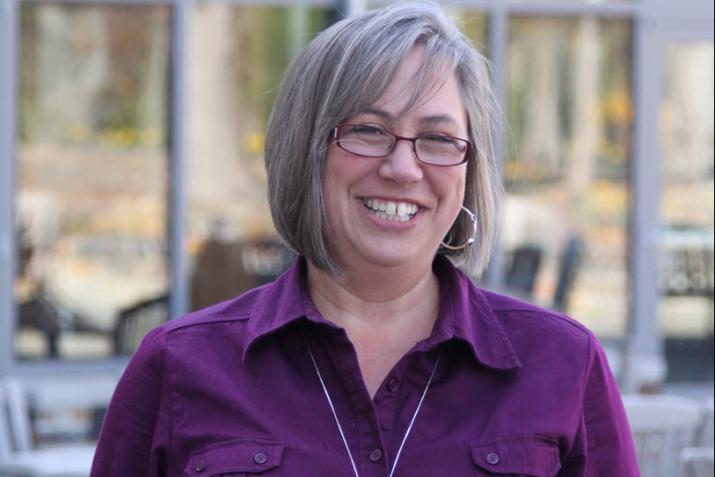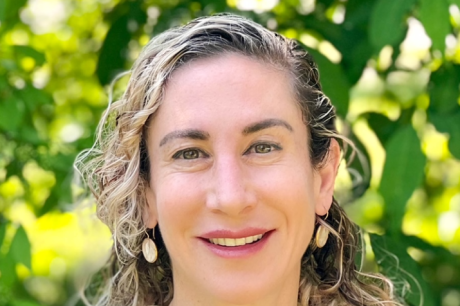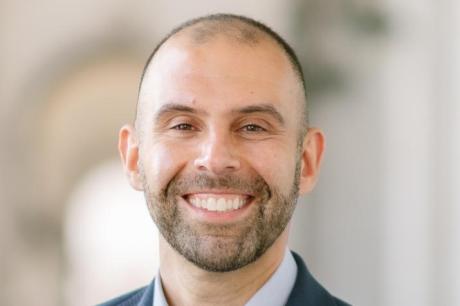Lysa MacKeen, assistant director for experiential learning at the Duke Global Health Institute, will tell you that she has the best job: essentially, helping students and faculty navigate the field research requirements of DGHI’s global health education programs. “I get to be a tiny little piece of the amazing things the students are learning and the impressive work they’re doing,” she says. “I spend my days talking with students about issues that are fundamental to how we live in the world. Does it get any better than that?”
MacKeen, a former Peace Corps volunteer and curriculum development consultant in West Africa, jumped at the opportunity to join DGHI in 2010. “The institute had everything that I liked—the global health component, a sense of mission, the feel of a start-up and the chance to work directly with students.”
At the time, DGHI had a new Master of Science in Global Health program and a global health certificate option for undergraduates, with about 60 students participating in experiential learning, or field research, a requirement for both programs. MacKeen was hired to streamline and expand the field research opportunities. Since 2010, DGHI education programs have grown substantially and the number of students engaging in field research has more than doubled.
MacKeen recently took us behind the scenes of experiential learning at DGHI; here are some excerpts from our conversation.
DGHI: What exactly goes into setting up field research relationships and sites?
MacKeen: There’s a fair bit of variety to some of the fieldwork processes, but generally, we look for an existing research collaboration if possible. It might be one of our partnership sites, or a faculty member with a grant who’s interested in student engagement on their project, or a faculty member who has a relationship with an NGO. The relationships come first, and they’re the foundation on which we build student opportunities.
Initial conversations with new sites cover topics like safety logistics, regulatory considerations and IRBs. Once we get to the question of how we’re going to bring students in, the conversation becomes triangular between the faculty lead, representatives from the site and the education team to determine what students might be a good match with that particular site. For example, some locations are fine for masters or medical students but not appropriate for undergraduates, and vice versa, if they can’t accommodate the level of robust research that our more advanced students need. So we consider things like how long people have been working together, what type of work is being done and whether they’re looking for students to execute pre-identified research tasks or be part of a research development process.
The first year we work with a partner site might be incredibly broad and have a heavier service-to-research balance because we’re getting to know each other, and the community is getting to know our students. At this stage, we’d be looking at placing undergraduates at the site. Then, typically in year two, we start to develop more narrow research goals, and it becomes a more viable placement for graduate students as well as undergrads.
And then once a site is established, we continue to develop the relationships and evaluate how things are going. When I visit field sites and talk with faculty and students, part of those conversations are about what relationships they see developing and what new opportunities might be evolving.
DGHI: How do you prepare students for their field research experience?
MacKeen: For undergraduates, we hold a series of pre-departure workshops. For master’s students, Melissa Watt [associate professor of global health] and I teach a one-credit pass/fail fieldwork preparation course. We discuss development of research proposals, Duke IRBs and international IRBs, health and safety, cultural considerations, ethical fieldwork documentation, Duke resources and more. But underpinning all of these sessions is a focus on preparing students for the inevitable challenges that occur when you move from planning to implementation. Hopefully, if we’ve done our jobs well, we’ve helped them set up good communication structures with their faculty mentors and field supervisors, so when something goes awry, they know where to go for help.
I’m the person who stands up in front of the room and says, “Be prepared for the unexpected.” In professional settings, things sometimes don’t go the way we expect. But the stakes often feel much higher to students, particularly graduate students, because they have only 10 weeks in a field setting and they need to come back with something that allows them to complete their thesis and graduate.
Part of why we require this experiential learning component is that no matter how much we talk about things in a classroom, it’s not until you get out in the field and are working collaboratively with a team, having to navigate challenges and different relationships, that you realize how complex and frustrating the work can be. But then, on the upside, you also learn how truly rewarding it can be, and you come away from the experience with more adaptability.
So fieldwork is the bridge between the classroom and professional practice. It’s the bridge between functioning in a supervised and structured environment and being a member of a team that’s working independently. Without it, I would worry that students wouldn’t understand until they were in their job settings that things are going to go sideways, timelines will shift and their goals may need to be modified.
What’s fun is when students come back from their fieldwork and say, “It turns out I knew how to do that.” The experience gives them a lot of confidence.
DGHI: How does your Peace Corps experience inform your work at DGHI?
MacKeen: In the Peace Corps, I was one of three health volunteers in Guinea. I worked with the “Combating Childhood Communicable Diseases” program. It was a 12-country Africa-based project funded and administered by the CDC [Centers for Disease Control]. Our job was to train healthcare workers in the region on the training matrices designed by the CDC. I worked with healthcare providers in rural health posts who were dealing with a very fragile cold chain to get vaccines to them. We were trying to figure out why they had such low vaccine rates and how training could be useful.
It was wonderful work, but I quickly saw a series of red flags. The program was conceived in a health office in the capital of Guinea working with the CDC in the United States. When you got into working with people in a rural health setting, it was infinitely more complex. My work there helped me understand how important it is to cultivate relationships in local communities when planning and implementing new programs. That piece comes with me everywhere—the idea that a program that was planned and conceived at a level outside the community may look very different when you move into the implementation phase.
We do need to engage in planning processes and consider structures and have conversations and outline research plans, but we also need to think about the factors that are going to influence the implementation process and how we’re going to navigate those. All of that comes into my role here at DGHI.
Learn more about DGHI's field research experiences for undergraduates and graduate students.



